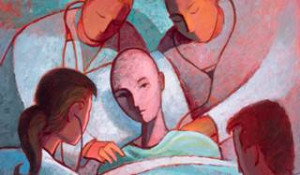 I often treat patients for specific injuries or conditions (such as tinnitus or TMJ to name just two), but at times acupuncture treatments can also help to relieve other ailments such as anxiety along the way. Anxiety, whether short term or chronic in form, is a widespread mental health concern affecting many people in this country—40 million American adults, or 18% of the population, according to the Anxiety and Depression Association of America. Although acupuncture is not a replacement for anxiety therapy, it can be a helpful adjunct to primary therapy. It can at times also offer a drug-free way for anxiety sufferers to improve their well being, which can be beneficial due to the side effects that anxiety medications sometimes cause.
I often treat patients for specific injuries or conditions (such as tinnitus or TMJ to name just two), but at times acupuncture treatments can also help to relieve other ailments such as anxiety along the way. Anxiety, whether short term or chronic in form, is a widespread mental health concern affecting many people in this country—40 million American adults, or 18% of the population, according to the Anxiety and Depression Association of America. Although acupuncture is not a replacement for anxiety therapy, it can be a helpful adjunct to primary therapy. It can at times also offer a drug-free way for anxiety sufferers to improve their well being, which can be beneficial due to the side effects that anxiety medications sometimes cause.
Using Electronic Stimulation with Acpuncture
 I employ a variety of techniques to treat patients at Rivertown Acupuncture, including the use of electric stimulation with acupuncture needles. Here is a brief overview of the range of conditions e-stim can help to alleviate.
I employ a variety of techniques to treat patients at Rivertown Acupuncture, including the use of electric stimulation with acupuncture needles. Here is a brief overview of the range of conditions e-stim can help to alleviate.
Electric stimulation, or e-stim, is very effective for augmenting trigger point therapy, which is by definition intramuscular stimulation. Instead of the practitioner inserting needles into ‘motor points’ (i.e., areas of constriction within the muscle) and manually stimulating to initiate fasciculation, the needles are instead connected to cables that conduct electricity. This is especially effective for chronic conditions such as sciatica, plantar fasciitis and low back pain.
However, electric stimulation can treat many more conditions than muscle constriction.
Acupuncture and Migraine Relief
 Migraine headaches are one of the most painful conditions people can suffer, even disabling people for days at a time. Unfortunately they’re not uncommon, affecting 18 percent of women and 6 percent of men in the United States. A migraine can involve a throbbing sensation, usually on one side of the head or in a certain location on the head. Sometimes migraine sufferers also experience nausea, vomiting, and severe sensitivity to light. Finding an effective solution can be challenging, but new research indicates that acupuncture may reduce the frequency, intensity, and duration of migraines.
Migraine headaches are one of the most painful conditions people can suffer, even disabling people for days at a time. Unfortunately they’re not uncommon, affecting 18 percent of women and 6 percent of men in the United States. A migraine can involve a throbbing sensation, usually on one side of the head or in a certain location on the head. Sometimes migraine sufferers also experience nausea, vomiting, and severe sensitivity to light. Finding an effective solution can be challenging, but new research indicates that acupuncture may reduce the frequency, intensity, and duration of migraines.
According to findings published in JAMA Internal Medicine, a team of Chinese scientists determined that acupuncture reduces the frequency of migraines for those who suffer from migraines without auras (there are different types of migraines, one of which features auras or visual sensations) after twenty weeks of treatment at the rate of five times a week. Patients receiving acupuncture also experienced fewer days total suffering from migraines with less severe symptoms overall. These are potentially positive indications that acupuncture could help to mitigate migraine pain for those who find it so debilitating.
When Patients Turn to Alternative Therapies
 Living in our technologically advanced society, it’s easy to think that the solution to a problem is just a screen tap away. However, when it comes to our health, finding the answer can sometimes be challenging. And when a health condition begins to limit the capacity to live a full life, it’s not hard to understand why some of us may try anything to regain our well-being.
Living in our technologically advanced society, it’s easy to think that the solution to a problem is just a screen tap away. However, when it comes to our health, finding the answer can sometimes be challenging. And when a health condition begins to limit the capacity to live a full life, it’s not hard to understand why some of us may try anything to regain our well-being.
As the New York Times reports in its review of Susannah Meadows’ new book The Other Side of Impossible, some people facing seemingly insoluble health burdens such as rheumatoid arthritis, severe food allergies, or even ADHD, seek out alternatives to traditional Western medicine so that they can find a remedy for the ailment that is causing so them so much pain and distress.
The Benefits of Regular Acupuncture Treatment
 Spring is finally here, and doesn’t it feel good after a long winter spent hibernating? It’s an ideal occasion for paying greater attention to self-care and balanced well being in all its forms. We recently explored this topic on the blog, explaining how acupuncture is especially helpful during the changing seasons since we’re more prone to suffer from colds or allergies at those moments of transition. Acupuncture can help fortify our immune systems at those intervals, to be sure, but it can also be valuable as a regular wellness treatment.
Spring is finally here, and doesn’t it feel good after a long winter spent hibernating? It’s an ideal occasion for paying greater attention to self-care and balanced well being in all its forms. We recently explored this topic on the blog, explaining how acupuncture is especially helpful during the changing seasons since we’re more prone to suffer from colds or allergies at those moments of transition. Acupuncture can help fortify our immune systems at those intervals, to be sure, but it can also be valuable as a regular wellness treatment.
People who’ve never experienced acupuncture treatment may not be familiar with how it works and when it is most effective. I certainly can and do treat people who come to me with specific health concerns after they have arisen (including injuries such as back pain). Some people also try acupuncture after failing to get a clear diagnosis from their doctor. However, acupuncture works best as a preventative form of treatment and is intended to keep the body from falling out of balance or becoming vulnerable to an illness. For that reason, it can be worthwhile to consider regular treatment so that you can get the greatest benefits that acupuncture has to offer.
Acupuncture and the Changing Seasons
 Here in New York, we are excited to welcome spring in all its glory. As temperatures climb and the sunny days lengthen, it’s a breath of fresh air to see green leaves and flowers returning. It’s a moment to pause and appreciate the beauty of the natural world, to be sure, but it can also be a time when our bodies are more vulnerable than usual to seasonal colds and illnesses. Our immune systems can find it difficult to keep up with the changing environment, and it’s at this time of the year that we are more likely to become sick or fall out of balance.
Here in New York, we are excited to welcome spring in all its glory. As temperatures climb and the sunny days lengthen, it’s a breath of fresh air to see green leaves and flowers returning. It’s a moment to pause and appreciate the beauty of the natural world, to be sure, but it can also be a time when our bodies are more vulnerable than usual to seasonal colds and illnesses. Our immune systems can find it difficult to keep up with the changing environment, and it’s at this time of the year that we are more likely to become sick or fall out of balance.
For this reason, acupuncture can be especially beneficial at points of seasonal change—particularly in the spring and fall, when our bodies have to work harder to adapt to rapidly shifting temperatures and external conditions. Some practitioners of Traditional Chinese Medicine (TCM) believe that the body’s Qi, or life force, frequency can fall out of harmony with the season’s frequency at this time, which may lead to such health difficulties. Acupuncture therapy unblocks the Qi energy that is trapped along the body’s energy pathways or meridians. When this happens, the body can begin its natural process of self-healing and the immune system in particular begins to strengthen as well.
A Brief History of Acupuncture
 If you’ve never received acupuncture treatment before, or perhaps even if you have, you may be curious to know how this ancient form of Traditional Chinese Medicine (TCM) originated. Acupuncture was first developed for medical use in China over 2,500 years ago. It is believed that the first detailed written description of acupuncture diagnosis and treatment appears in a document known as Huangdi Neijing (The Yellow Emperor’s Classic of Internal Medicine), which is dated at about 100 BCE.
If you’ve never received acupuncture treatment before, or perhaps even if you have, you may be curious to know how this ancient form of Traditional Chinese Medicine (TCM) originated. Acupuncture was first developed for medical use in China over 2,500 years ago. It is believed that the first detailed written description of acupuncture diagnosis and treatment appears in a document known as Huangdi Neijing (The Yellow Emperor’s Classic of Internal Medicine), which is dated at about 100 BCE.
After becoming established practice in China, acupuncture soon spread to neighboring countries. It’s thought that acupuncture first traveled to nearby Korea before crossing over to Vietnam and Japan as well. It finally reached Europe in the second half of the 17th century. The word ‘acupuncture’ first appeared in the Dutch text De Acupunctura, which introduced this form of medical treatment to a Western audience. Acupuncture has become far more popular in the West in the past few decades, and has since been incorporated as an approved method of treatment at some leading academic medical centers and hospitals here in the United States.
There are many different styles of acupuncture being practiced throughout the world today. They do share one guiding practice in common, however. All forms of acupuncture promote the circulation of Qi, or life force energy, along channels known as meridians. Acupuncture therapy involves carefully applying very fine needles at specific meridians throughout the body. Ailments such as stress, emotional issues, injuries, or even poor nutrition can block these energy pathways, preventing Qi from bringing the body back into balance. Acupuncture seeks to remove these blocks so that the body can regain its optimal strength and heal itself.
Rivertown Acupuncture offers a range of treatments to address your symptoms. Trigger point needle therapy can be particularly effective at releasing muscle pain, whereas the gentler Japanese approach can be used to stimulate healing of headaches, organ dysfunction and pain.. I’ve also used acupuncture, diodes, and moxa to treat ailments like edema or tinnitus. I have even used castor oil to complement acupuncture treatment at times. If you are experiencing pain associated with an injury, stress, fatigue, insomnia, or another health condition that has caused you to fall out of balance, it may be worth considering how acupuncture—with its long, venerated history of practice throughout Asia and now the West as well—can help restore your wellbeing so you may live a fuller, more active life.
Acupuncture and Palliative Care
 Palliative care, which aims to provide patients suffering from serious illnesses with meaningful relief from the symptoms and stress they are experiencing, is becoming a more prominent aspect of medical care today. Ultimately, palliative care is a holistic approach designed to improve the quality of life for both the patient and their loved ones. In this respect, it is quite well aligned with acupuncture’s holistic approach to treating illness, since acupuncture also aims to reduce stress and address symptoms in such a way that strengthens the body’s immune response and gives the patient renewed energy and vitality.
Palliative care, which aims to provide patients suffering from serious illnesses with meaningful relief from the symptoms and stress they are experiencing, is becoming a more prominent aspect of medical care today. Ultimately, palliative care is a holistic approach designed to improve the quality of life for both the patient and their loved ones. In this respect, it is quite well aligned with acupuncture’s holistic approach to treating illness, since acupuncture also aims to reduce stress and address symptoms in such a way that strengthens the body’s immune response and gives the patient renewed energy and vitality.
It’s important to note that palliative care is distinct from hospice care, although the two methods of treatment are sometimes confused with one another. Palliative care focuses on relieving patients’ suffering during a serious illness whether they have received a terminal diagnosis or not. In fact, it can be administered alongside curative treatment that seeks to heal the illness and restore the patient to full health. Hospice care, by contrast, tends solely to the needs of a patient who is at the end of life stage of their illness.

